Covid not out of control in Wales, First Minister Mark Drakeford insists
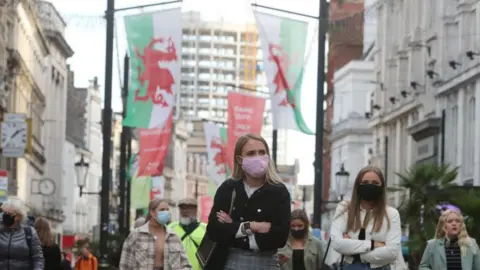 Getty Images
Getty ImagesThe coronavirus situation in Wales is "very difficult" but not out of control, according to the country's first minister.
Mark Drakeford defended his government's decision to have a short lockdown of 17 days in the autumn.
He has faced accusations from the opposition of losing his grip on Covid.
It comes as Wales' top doctor says ministers are considering whether new measures might be needed before Christmas.
Chief Medical Officer Frank Atherton warned there was "serious pressure" on the NHS in the country, particularly in south Wales.
The government is already looking at what might be needed after the festive holiday, although the first minister had suggested on Tuesday that he would not impose new restrictions before Christmas.
Mr Drakeford has claimed that the recent rise in cases was partly due to people not being willing to follow the rules.
As well as criticising the government's performance the Welsh Conservatives and Plaid Cymru called on ministers to think again about a ban on alcohol in pubs and restaurants in a debate on Wednesday.
Health minister Vaughan Gething warned relaxing the measures would mean more people would die.
On Tuesday it emerged the Welsh Government's own advisers warned the number of deaths had been above the worst case scenario in recent weeks.
Wales had 326.84 cases per 100,000 people in the seven days up to 5 December, up from 223.86 in the week up to 23 November.
Dr Atherton said the rate is now almost 350 cases per 100,000 people.
Meanwhile the chief medical officer called for people not to mix outside their household in the run up to Christmas.
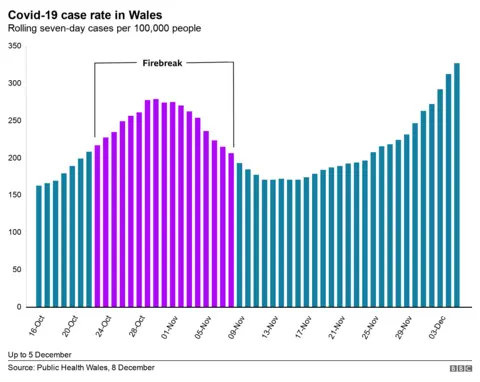

How do Covid rates in Wales compare with other hotspots?
By Ben Butcher, Reality Check
In Wales, the increasing coronavirus rate is generally focused in the more densely populated parts of the country, which include the south and Wrexham, in the north east.
Weekly rates are highest in Neath Port Talbot where there are 613 cases for every 100,000 people - twice the Welsh national rate.
Rhondda, Blaenau Gwent, Merthyr Tydfil, Swansea and Torfaen are also recording case rates above 400 per 100,000, according to data collected by the UK government.
Within these areas though, are particularly high pockets of coronavirus, including rates above 1,200 cases per 100,000 in Caerau in Bridgend, Aberdulais & Resolfen in Port Talbot and Ferndale & Maerdy, Rhondda.
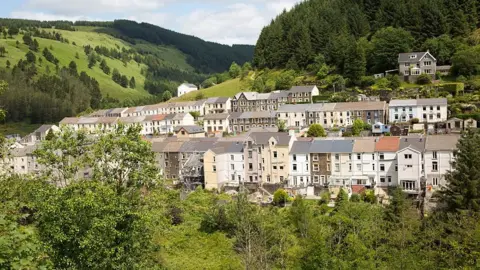 Getty Images
Getty ImagesSo, how does that compare with England?
Nationally, England's case rate of 150 cases per 100,000 is roughly half that of Wales.
And, with the exception of Medway, England currently has no local authorities with case rates higher than 400 cases per 100,000 people.
However, there are small pockets in some areas with high case rates.
This includes Great Chell, Stoke-on-Trent where cases are as high as 1,313 per 100,000 people - although mass testing might contribute to this. Chatham South and parts of Rochester in Medway also have high rates.
These local hotspots could be due to an outbreak in a school, hospitals or workplaces, which can be controlled if found quickly.
In October, many university towns and cities saw localised outbreaks on campuses, including Fallowfield in Manchester where the rate went as high as 7,574 cases per 100,000.

Speaking to BBC Breakfast, Mr Drakeford said: "The virus is in a very difficult position in Wales, I wouldn't describe it as out of control."
Mr Drakeford said he had taken action to bring the virus under control through his decision to ban the sale of alcohol in hospitality venues and close them in the evenings, "in the teeth of opposition", he said, "from other parties".
'The firebreak did everything we hoped'
Defending his government's handling of the crisis, he emphasised the personal responsibility of Welsh citizens in bringing rates down.
He denied that Wales had come out of the firebreak too early: "The firebreak period did everything that we had hoped.
"It set the clock back three weeks. It gave us three weeks where the R number was below one."
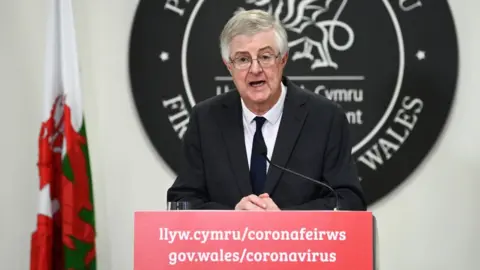 Getty Images
Getty ImagesBut those gains had waned since, Mr Drakeford said.
"And that is partly because despite the very strict rules we have here in Wales, fatigue - people's sense of no hope for the future - has meant that not everybody has been willing to abide by the restrictions that are still necessary."
After the firebreak Wales abandoned the system of local lockdowns, which had covered most of the population and effectively barred non-essential travel outside of county boundaries.
But Mr Drakeford insisted that the post-firebreak rules "were very strict".
"They were stricter than the rules we had before we went into it, in restricting people's ability to meet inside homes and meeting in gardens, a smaller number of people able to meet outdoors and so on," he said.
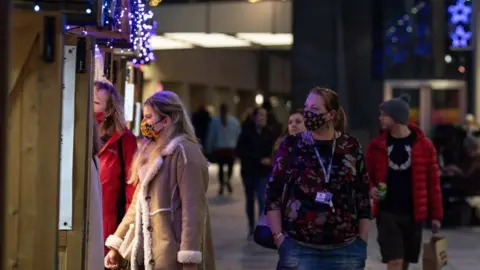 Huw Fairclough
Huw FaircloughWhat has the opposition said?
Andrew RT Davies, the Welsh Conservative health spokesman, said: "It would seem that there are those within the Welsh Labour-led Government speaking from different scripts. Messaging is confusing and contradictory.
"But this is set against the backdrop of the highest reported rates of deaths and new infections in the UK, and at the same time, the number of days a person needs to self-isolate for being reduced to 10. Hardly fitting into the narrative Labour's been pushing of keeping Wales safe."
Plaid Cymru health spokesman Rhun ap Iorwerth said: "We all have a responsibility as individuals to do the right things to keep ourselves, our friends, families and communities safe.
"But government can't simply try to deflect all the blame onto others - ministers have to keep their side of the bargain by putting robust strategies in place, enforcing restrictions properly, communicating effectively and giving people the support they need to stop the spread of the virus." "Plaid Cymru called for more sustainable measures as we came out of the firebreak - including a more gradual easing of restrictions and optimising Wales' own testing capacity to reach the 24-hour turnaround timescale target.
"The Labour Welsh Government failed to do that and now hospitality is paying the price."

The grim figures on Covid cases, deaths and hospital inpatients are increasing the pressure on ministers.
They say that the behaviour of some members of the public partly explains this picture.
While no one can deny that the choices we make have consequences for Covid spread, public behaviour alone can't explain why Wales has become an outlier amongst the home nations - after all England, Scotland and Northern Ireland all have people making choices about their lives, just as we do in Wales.
Policy decisions are relevant too and so is the timing of them.
The first minister insists that the controversial hospitality restrictions will start to make a difference soon but the Christmas relaxation will likely push case rates in the wrong direction.
That means more tough policy decisions are imminent.

Alcohol debate
In the Senedd on Wednesday the Welsh Conservatives and Plaid Cymru called for measures introduced last Friday to ban the sale of alcohol in hospitality venues to be looked at again.
The Conservative Darren Millar called for the "immediate suspension" of the regulations "and for a more targeted and proportionate approach going forward".
"We believe that the decision to impose severe restrictions on the hospitality and entertainment industries across Wales is neither proportionate nor reasonable," he said.
Plaid Cymru's Rhun ap Iorwerth said his party wanted a rethink because "elements of the nationwide restrictions were wrong".
Some people were "questioning the logic" of the latest measures, he said, because four people can meet for a coffee but "not even an individual can have a quiet pint in the same establishment".
'Elected dictatorship'
But the Health Minister Vaughan Gething said he hoped the "sobering, troubling and undeniably serious figures of the last few days will have given all members the time to pause and reflect".
"As we face the prospect of greater harm, as we face the prospect of a hard, difficult and deadly winter ahead of us without further changes, I hope that in the face of that prospect members will reflect on whether this Senedd should vote today to relax restrictions.
"I believe doing so will undoubtedly cause greater harm and undoubtedly will lead to avoidable deaths for the people we serve."
Independent Reform Alliance MS Caroline Jones said she was "disappointed" that the Senedd was simply being asked to "rubber stamp decisions which have already been made".
"This isn't democracy. This has become an elected dictatorship," she said.
Senedd members voted to reject a series of opposition demands for changes to the strategy.
Conservative calls for ministers to publish the evidence they based their decision for closing indoor entertainment venues on, and to make "sufficient financial support available to businesses in a timely manner", were supported by all the parties in the chamber.
Members will vote on whether they approve the regulations themselves next week.
